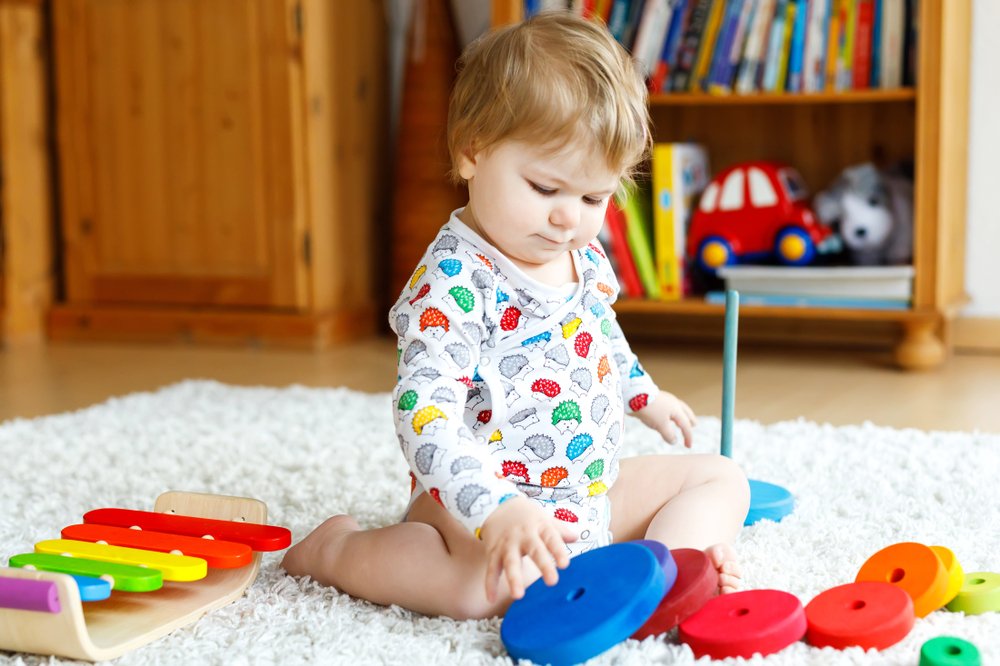Key points:
- Play is essential for childhood development, fostering problem-solving skills and social interactions.
- Babies initially explore everything, including toys and household objects, through mouthing, shaking, and banging.
- Play evolves as babies grow, from holding rattles to exploring textures, sounds, and fine motor skills.
- Encourage your baby’s development through age-appropriate toys and play experiences.
Babies and toddlers explore and learn about the world that surrounds them by playing with objects. By doing this not only do they have fun, but they learn essential problem-solving skills and practice having social interactions. Play is a must in childhood and understanding which activities and toys best suit your baby and toddler are key for the development of skills and milestones.
At first, babies don’t understand the difference between toys and regular household objects. Everything they see, touch, taste, and feel is new and exciting. They will explore the object by mouthing, shaking, banging, and even throwing, to see what happens. With time, babies learn to differentiate between toys and regular objects, but they will use them in the way that is most enjoyable to them. If a rattle makes a fun noise when thrown, then they will do this repeatedly.
How does play develop?
Here is a list of how babies and toddlers play through different ages and stages, and the toys that are a must for your home!
- 2-4 months: During these months you can hand your baby a small rattle and see them hold it for a small amount of time, observe the object and even mouth it. Small colorful rattles are best for this stage.
- 3-6 months: Mouthing might be the primary means of exploration for your baby, but around this age your little one will also begin to move, shake, or bang the objects you give them. Colorful and soft toys that make sounds when you move them are recommended. You can also introduce toys with teething sections to soothe your baby’s gums.
- 5-7 months: During these months, banging toys will start. This stage is all about exploring the effect a toy makes when it hits another. Your little one might bang the toy with their hands or even discover that something occurs when they bang the toy against another. Noisy objects can be very attractive at this stage.
- 6-9 months: Your baby’s attention span will begin to increase allowing for longer periods of play with a single toy. However, don’t think they will engage for very long, your baby might only play with a toy for 2-5 minutes. On the other hand, they will explore it in different ways by maybe pushing or turning it. Here you’ll begin to see your baby’s preferences for certain toys when they are playing. At this stage, provide them with different textures to explore. Everyday household objects will be very enticing. Just make sure they are baby-proof before handing them over.
- 7-9 months: Fine motor skills are beginning to develop so anything that can be torn or crumpled will be fascinating for your baby. Take out some old magazines or roll out the toilet paper and have fun with your little one while they develop the important milestone of finger dexterity.
- 6-11 months: The milestone of rolling or sliding a toy develops during these months. It’s time to fill your home with colorful and soft balls or big toy cars.
- 9-12 months: Your baby’s growing cognitive development allows them to associate objects that go together such as a spoon and a bowl. Reinforce this cognitive development by playing with objects that go together such as a drum and a stick.
As you can see, your baby’s skills develop by playing. It is what children do and the best and most fun way for them to learn. Surround your little one with lots of opportunities to play and explore, and be sure to check out our catalog for lots of ways and ideas to incorporate the suggested toys during play time. And, most of all, don’t forget to have fun!








